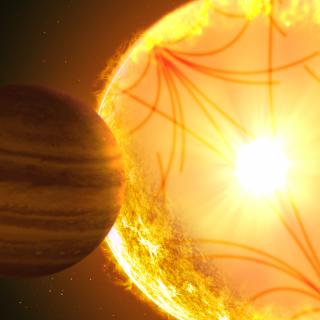Bibcode
Mathur, S.; Eff-Darwich, A.; García, R. A.; Turck-Chièze, S.
Referencia bibliográfica
Astronomy and Astrophysics, Volume 484, Issue 2, 2008, pp.517-522
Fecha de publicación:
6
2008
Revista
Número de citas
69
Número de citas referidas
44
Descripción
Context: The dynamics of the solar core cannot be properly constrained
through the analysis of acoustic oscillation modes. Gravity modes (g
modes) are necessary to understand the structure and dynamics of the
deepest layers of the Sun. Through recent progress on the observation of
these modes - both individually and collectively - new information is
available to contribute to inferring the rotation profile inside the
nuclear burning core. Aims: We aim to see the sensitivity of
gravity modes to the rotation of the solar core. We analyze the
influence of adding the splitting of one and several g modes to the data
sets used in helioseismic numerical inversions. We look for constraints
on the uncertainties required in the observations to improve the derived
core rotation profile. Methods: We compute three artificial sets
of splittings derived for three rotation profiles: a rigid profile taken
as a reference; a step-like profile and a smoother profile with higher
rates in the core. We compute inversions based on regularized
least-squares methodology (RLS) for both artificial data with real error
bars and real data. Several sets of data are used: first, we invert only
acoustic modes (p modes), then we add one and several g modes to which
different values of observational uncertainties (75 and 7.5 nHz) are
attributed. For the real data, we include g-mode candidate, ℓ=2,
n=-3 with several splittings and associated uncertainties. Results: We show that the introduction of one g mode in artificial
data improves the rate in the solar core and gives an idea of the
tendency of the rotation profile. The addition of more g modes lends
greater accuracy to the inversions and stabilizes them. The inversion of
real data with the g-mode candidate gives a rotation profile that
remains unchanged down to 0.2 R&sun;, whatever value of
splitting we attribute to the g mode.
Proyectos relacionados

Sismología Solar y Estelar y Búsqueda de Exoplanetas
Los objetivos genéricos de este Proyecto son: 1) el estudio de la estructura y dinámica del interior solar, 2) la extensión de dicho estudio al caso de otras estrellas, 3) la búsqueda y caracterización de planetas extrasolares por métodos fotométricos (principalmente mediante el método de tránsitos) y espectroscópico (variaciones en la velocidad
Savita
Mathur